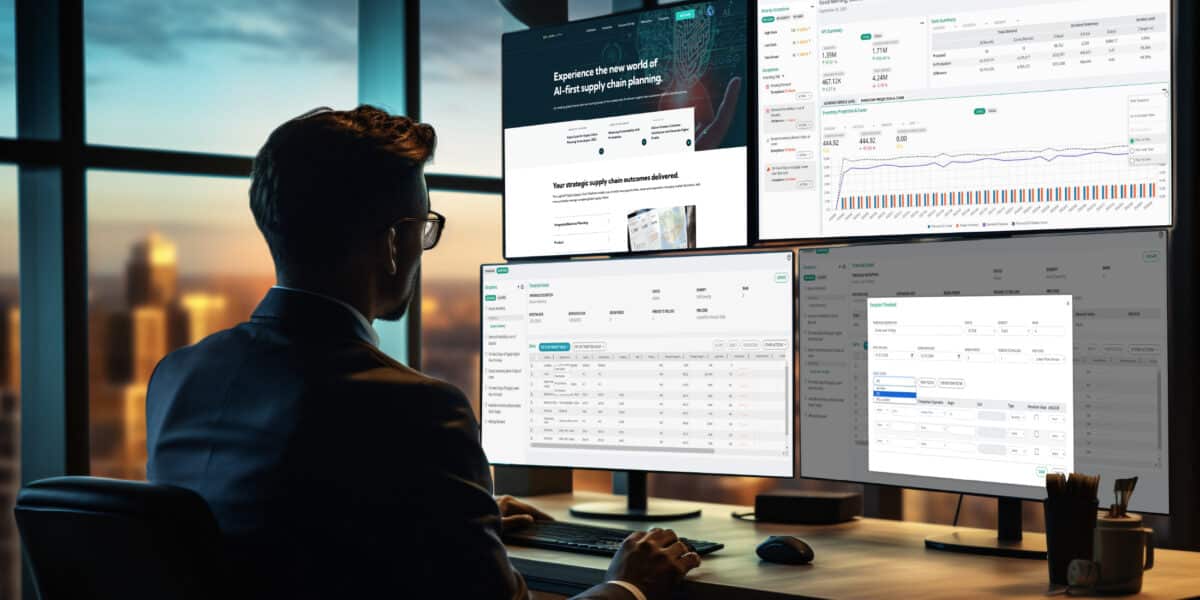
7 ways sustainable supply chains improve your business’s bottom line.
Key Takeaways
- Sustainable practices give businesses a competitive edge
- Traceability solutions allow businesses to back up their sustainability claims
- Visibility into the supply chain allows businesses to optimize their practices
- Sustainable practices save businesses money
- Sustainability protects brand reputation
- Traceability verifies compliance of third- and fourth-tier suppliers
- Diverse supply chains safeguard operational continuity
Sustainable business practices are critical for brands that want to succeed in today’s market. Sustainability refers to managing the environmental, social, and economic impact of a business in a way that reduces harm and benefits the world. While these practices often present extra costs, they bring significant value as well.
Businesses cannot survive unless they are committed to sustainability. Ideally, this should happen at every level of the supply chain, from sourcing raw materials to delivering products to end consumers and even to returns and recycling processes.
Businesses need to balance their bottom line and the ‘green line’, and sustainability practices backed by the right technology allow you to strike that balance. To help you understand the value of sustainable supply chains, this guide explains the business benefits of sustainability.
1. Sustainability is a competitive differentiator
Today’s consumers want to work with sustainable businesses. They don’t want to be complicit in environmental harm or unfair labor practices. They seek out companies that are committed to sustainability.
Companies can use their sustainability practices as a competitive differentiator. If two products or services offer similar quality at similar price points, many consumers will choose the more sustainable option. Building sustainability practices into your business gives you a competitive edge.
2. Traceability allows businesses to back up sustainability claims
The vast majority of businesses are committed to sustainability on paper. About two-thirds of companies have developed a sustainability purpose statement, and 23% are in the process of doing so.
However, simply making a sustainability claim is not enough. Consumers dig deep into the companies they patronize. If a company cannot support its sustainability claims with verifiable practices, it will lose support and money.
3. Businesses need visibility into the supply chain
Many businesses lack oversight of their supply chains, especially when dealing with N-tier suppliers. When businesses can’t see what they are doing or who they are dealing with, they cannot back up their sustainability claims. But even more significantly, they cannot track their sustainability practices.
Traceability solutions allow you to see exactly what’s happening at every step in the supply chain. This makes it easier to set goals and track your progress. It also allows you to see problem areas and make changes quickly to ensure your practices reflect your corporate social responsibility statement.
4. A sustainable supply chain protects your brand
If a partner in your supply chain is using unfair labor practices or committing environmental injustices, that will reflect poorly on your brand. Ignorance is not an excuse in this situation. Consumers tend to view unethical practices by your suppliers just as harshly as if you committed them yourselves.
When you don’t know what’s happening in your supply chain, you put your business and your brand at risk. Traceability solutions allow you to keep an eye on your suppliers. If you see unethical practices that break the terms of your compliance agreements, you can change course quickly.
5. A sustainable supply chain reduces a company’s greenhouse emissions
Over 80% of a consumer company’s greenhouse gas emissions come from its supply chain. If a company can make its supply chain more sustainable, it can reduce its greenhouse gas emissions. This can save companies money directly through savings on energy bills and increased innovation.
But these measures also save money indirectly by protecting the environment. Right now, businesses are incurring annual losses of €300 million ($347 million) due to natural disasters caused by climate change. By making their supply chains more sustainable, businesses lessen their degree of environmental harm.
Businesses may find ways to reduce CO2 emissions related to warehousing and transportation functions. For example, they may develop more optimized routes, take advantage of CO2-neutral delivery options, or use truckload planning tools to reduce empty miles.
6. Reducing environmental harm can improve profit margins
Simple, sustainable practices can save businesses money. For example, a practice as basic as connecting devices to a power strip and ensuring everything is off at night reduces electricity consumption. Businesses can also get creative and invest in programs such as training drivers to drive in a more fuel-efficient manner, and those savings add up.
Similarly, businesses may change manufacturing methods in a way that reduces labor and material costs, and saves money. There are countless ways businesses can use sustainability to drive savings in very specific, measurable ways.
7. A diverse supply chain improves continuity
To make your supply chain more sustainable, you need to make it more diverse. This allows you to quickly pivot as needed if your suppliers are using unsustainable practices, but it also protects the continuity of your supply chain.
If something happens to one of your suppliers, you already have established relationships with other suppliers, and you can lean on them. Companies without diverse supply chains suffer delays, shortages, and downtime if something happens to their suppliers. For example, if you exclusively rely on suppliers in a single country and that area experiences a natural disaster, you will struggle to meet your customers’ needs, and your business will suffer.
A sustainable supply chain makes good business sense. Sustainability isn’t just a buzzword, and sustainable practices do more than impress consumers. They help to protect your bottom line and your reputation while also benefitting the world.
Contact Logility to talk about sustainability challenges and solutions
At Logility, we have what you need to make your supply chain more sustainable. Our digital supply chain platform supports supply chain traceability, corporate social responsibility, fair trade, and fair labor. To learn more about how a sustainable supply chain is an investment into your organization, contact us today. We look forward to helping your organization become more sustainable and more successful.


